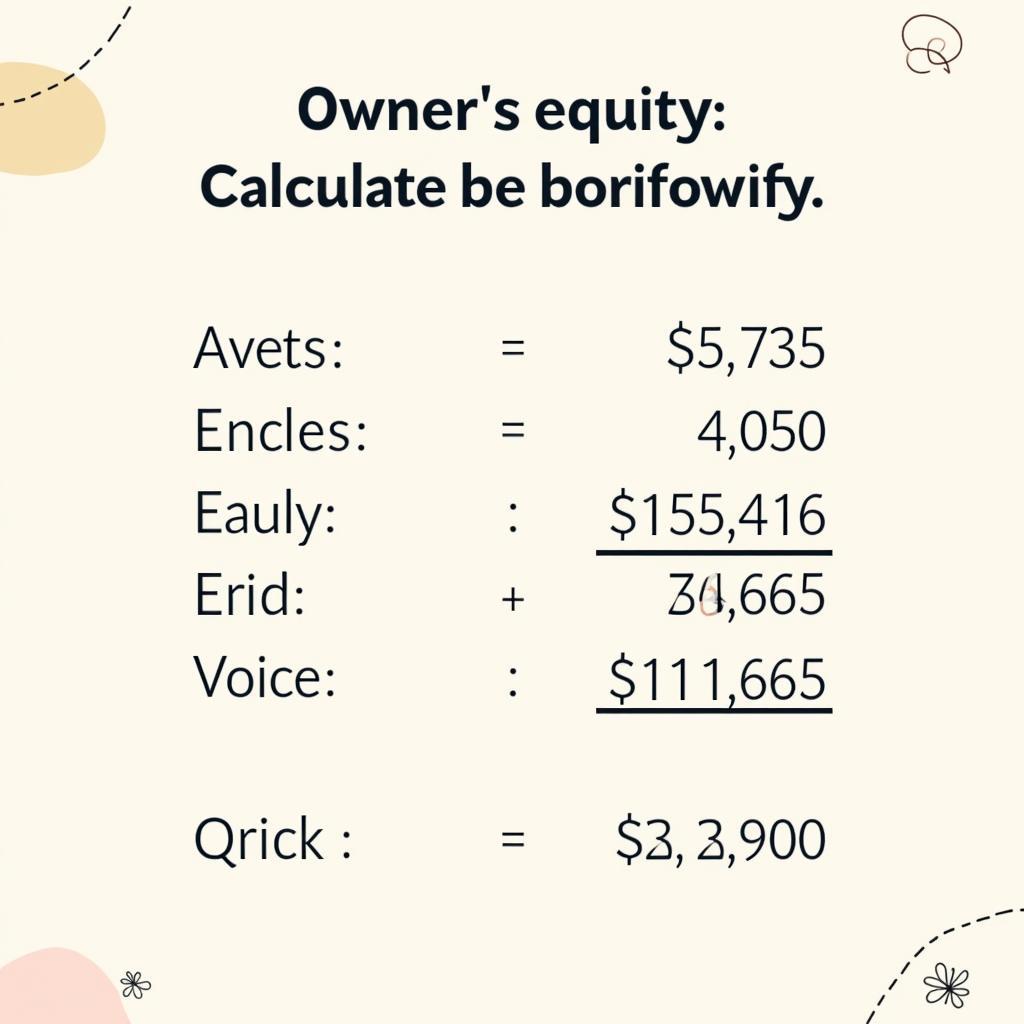Stockholders equity vs owner’s equity – these two terms often cause confusion, especially for those new to the world of finance. While they both represent the residual interest in a company’s assets after deducting liabilities, there are key distinctions based on the business structure. Understanding these differences is crucial for investors, business owners, and anyone analyzing financial statements.
What is Owner’s Equity?
Owner’s equity represents the owner’s stake in a sole proprietorship or partnership. It’s calculated by subtracting liabilities from assets. This reflects the owner’s investment in the business, as well as accumulated profits. In simpler terms, it’s what the owner would receive if all assets were sold and all debts were paid.
How to Calculate Owner’s Equity
Owner’s equity is calculated using the following formula:
Assets – Liabilities = Owner’s Equity
This simple equation highlights the direct relationship between a company’s assets, liabilities, and the owner’s stake.
 Calculating Owner's Equity
Calculating Owner's Equity
What is Stockholders’ Equity?
Stockholders’ equity, also known as shareholders’ equity, represents the ownership interest in a corporation. It includes common stock, preferred stock, retained earnings, and treasury stock. This reflects the capital invested by shareholders, plus any accumulated profits reinvested in the business.
Components of Stockholders’ Equity
Stockholders’ equity is more complex than owner’s equity and includes several components:
- Common Stock: The value of shares issued to common stockholders.
- Preferred Stock: The value of shares issued to preferred stockholders, who have preferential rights over common stockholders.
- Retained Earnings: Accumulated profits reinvested in the business rather than distributed as dividends.
- Treasury Stock: Shares of the company’s own stock that have been repurchased.
Stockholders Equity vs Owner’s Equity: Key Differences
The primary difference between stockholders’ equity and owner’s equity lies in the business structure. Owner’s equity applies to sole proprietorships and partnerships, while stockholders’ equity applies to corporations. This distinction leads to other key differences:
- Ownership Structure: Owner’s equity represents ownership by one or a few individuals, while stockholders’ equity represents ownership by multiple shareholders.
- Complexity: Owner’s equity is simpler to calculate and understand, while stockholders’ equity involves more complex components.
- Liability: Owners in a sole proprietorship or partnership have unlimited liability, while stockholders in a corporation have limited liability.
- Transferability of Ownership: Ownership in a sole proprietorship or partnership is less easily transferable than shares in a corporation.
 Stockholders Equity vs Owners Equity
Stockholders Equity vs Owners Equity
Conclusion: Understanding the Differences Matters
Understanding the difference between stockholders equity vs owner’s equity is crucial for anyone involved in business or finance. While both represent ownership interest, the specific terms and calculations depend on the business structure. Recognizing these distinctions allows for a more accurate understanding of a company’s financial health and ownership structure.
FAQ
- What is the main difference between stockholders equity and owner’s equity? The main difference lies in the type of business structure.
- Which type of business uses owner’s equity? Sole proprietorships and partnerships use owner’s equity.
- What does stockholders’ equity represent? It represents ownership in a corporation.
- What are the components of stockholders’ equity? Common stock, preferred stock, retained earnings, and treasury stock.
- Why is it important to understand these differences? It helps in analyzing a company’s financial health and ownership structure.
- How is owner’s equity calculated? Assets – Liabilities = Owner’s Equity
- What is treasury stock? Shares of a company’s own stock that it has repurchased.
Gợi ý các câu hỏi khác, bài viết khác có trong web:
- Phân tích báo cáo tài chính
- Đầu tư vào thị trường chứng khoán
- Các loại hình doanh nghiệp
Khi cần hỗ trợ hãy liên hệ Số Điện Thoại: 0372999888, Email: aibongda@gmail.com Hoặc đến địa chỉ: 236 Cầu Giấy, Hà Nội. Chúng tôi có đội ngũ chăm sóc khách hàng 24/7.